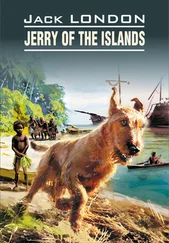Jack London - Jerry of the Islands
Здесь есть возможность читать онлайн «Jack London - Jerry of the Islands» весь текст электронной книги совершенно бесплатно (целиком полную версию без сокращений). В некоторых случаях можно слушать аудио, скачать через торрент в формате fb2 и присутствует краткое содержание. Жанр: Классическая проза, Морские приключения, на английском языке. Описание произведения, (предисловие) а так же отзывы посетителей доступны на портале библиотеки ЛибКат.
- Название:Jerry of the Islands
- Автор:
- Жанр:
- Год:неизвестен
- ISBN:нет данных
- Рейтинг книги:4 / 5. Голосов: 1
-
Избранное:Добавить в избранное
- Отзывы:
-
Ваша оценка:
- 80
- 1
- 2
- 3
- 4
- 5
Jerry of the Islands: краткое содержание, описание и аннотация
Предлагаем к чтению аннотацию, описание, краткое содержание или предисловие (зависит от того, что написал сам автор книги «Jerry of the Islands»). Если вы не нашли необходимую информацию о книге — напишите в комментариях, мы постараемся отыскать её.
Jerry of the Islands — читать онлайн бесплатно полную книгу (весь текст) целиком
Ниже представлен текст книги, разбитый по страницам. Система сохранения места последней прочитанной страницы, позволяет с удобством читать онлайн бесплатно книгу «Jerry of the Islands», без необходимости каждый раз заново искать на чём Вы остановились. Поставьте закладку, и сможете в любой момент перейти на страницу, на которой закончили чтение.
Интервал:
Закладка:
Though Jerry never laid eyes on Somo again, Bashti returned with his tribe the same day, grinning and chuckling as he appraised the damage. Only a few grass houses had been damaged by the shells. Only a few coconuts had been chopped down. And as for the slain pigs, lest they spoil, he made of their carcasses a great feast. One shell had knocked a hole through his sea-wall. He enlarged it for a launching-ways, faced the sides of it with dry-fitted coral rock, and gave orders for the building of an additional canoe-house. The only vexation he suffered was the death of Nalasu and the disappearance of Jerry—his two experiments in primitive eugenics.
CHAPTER XX
A week Jerry spent in the bush, deterred always from penetrating to the mountains by the bushmen who ever guarded the runways. And it would have gone hard with him in the matter of food, had he not, on the second day, encountered a lone small pig, evidently lost from its litter. It was his first hunting adventure for a living, and it prevented him from travelling farther, for, true to his instinct, he remained by his kill until it was nearly devoured.
True, he ranged widely about the neighbourhood, finding no other food he could capture. But always, until it was gone, he returned to the slain pig. Yet he was not happy in his freedom. He was too domesticated, too civilized. Too many thousands of years had elapsed since his ancestors had run freely wild. He was lonely. He could not get along without man. Too long had he, and the generations before him, lived in intimate relationship with the two-legged gods. Too long had his kind loved man, served him for love, endured for love, died for love, and, in return, been partly appreciated, less understood, and roughly loved.
So great was Jerry’s loneliness that even a two-legged black-god was desirable, since white-gods had long since faded into the limbo of the past. For all he might have known, had he been capable of conjecturing, the only white-gods in existence had perished. Acting on the assumption that a black-god was better than no god, when he had quite finished the little pig, he deflected his course to the left, down-hill, toward the sea. He did this, again without reasoning, merely because, in the subtle processes of his brain, experience worked. His experience had been to live always close by the sea; humans he had always encountered close by the sea; and down-hill had invariably led to the sea.
He came out upon the shore of the reef-sheltered lagoon where ruined grass houses told him men had lived. The jungle ran riot through the place. Six-inch trees, throated with rotten remnants of thatched roofs through which they had aspired toward the sun, rose about him. Quick-growing trees had shadowed the kingposts so that the idols and totems, seated in carved shark jaws, grinned greenly and monstrously at the futility of man through a rime of moss and mottled fungus. A poor little sea-wall, never much at its best, sprawled in ruin from the coconut roots to the placid sea. Bananas, plantains, and breadfruit lay rotting on the ground. Bones lay about, human bones, and Jerry nosed them out, knowing them for what they were, emblems of the nothingness of life. Skulls he did not encounter, for the skulls that belonged to the scattered bones ornamented the devil devil houses in the upland bush villages.
The salt tang of the sea gladdened his nostrils, and he snorted with the pleasure of the stench of the mangrove swamp. But, another Crusoe chancing upon the footprint of another man Friday, his nose, not his eyes, shocked him electrically alert as he smelled the fresh contact of a living man’s foot with the ground. It was a nigger’s foot, but it was alive, it was immediate; and, as he traced it a score of yards, he came upon another foot-scent, indubitably a white man’s.
Had there been an onlooker, he would have thought Jerry had gone suddenly mad. He rushed frantically about, turning and twisting his course, now his nose to the ground, now up in the air, whining as frantically as he rushed, leaping abruptly at right angles as new scents reached him, scurrying here and there and everywhere as if in a game of tag with some invisible playfellow.
But he was reading the full report which many men had written on the ground. A white man had been there, he learned, and a number of blacks. Here a black had climbed a coconut tree and cast down the nuts. There a banana tree had been despoiled of its clustered fruit; and, beyond, it was evident that a similar event had happened to a breadfruit tree. One thing, however, puzzled him—a scent new to him that was neither black man’s nor white man’s. Had he had the necessary knowledge and the wit of eye-observance, he would have noted that the footprint was smaller than a man’s and that the toeprints were different from a Mary’s in that they were close together and did not press deeply into the earth. What bothered him in his smelling was his ignorance of talcum powder. Pungent it was in his nostrils, but never, since first he had smelled out the footprints of man, had he encountered such a scent. And with this were combined other and fainter scents that were equally strange to him.
Not long did he interest himself in such mystery. A white man’s footprints he had smelled, and through the maze of all the other prints he followed the one print down through a breach of sea-wall to the sea-pounded coral sand lapped by the sea. Here the latest freshness of many feet drew together where the nose of a boat had rested on the beach and where men had disembarked and embarked again. He smelled up all the story, and, his forelegs in the water till it touched his shoulders, he gazed out across the lagoon where the disappearing trail was lost to his nose.
Had he been half an hour sooner he would have seen a boat, without oars, gasoline-propelled, shooting across the quiet water. What he did see was an Arangi . True, it was far larger than the Arangi he had known, but it was white, it was long, it had masts, and it floated on the surface of the sea. It had three masts, sky-lofty and all of a size; but his observation was not trained to note the difference between them and the one long and the one short mast of the Arangi . The one floating world he had known was the white-painted Arangi . And, since, without a quiver of doubt, this was the Arangi , then, on board, would be his beloved Skipper. If Arangis could resurrect, then could Skippers resurrect, and in utter faith that the head of nothingness he had last seen on Bashti’s knees he would find again rejoined to its body and its two legs on the deck of the white-painted floating world, he waded out to his depth, and, swimming dared the sea.
He greatly dared, for in venturing the water he broke one of the greatest and earliest taboos he had learned. In his vocabulary was no word for “crocodile”; yet in his thought, as potent as any utterable word, was an image of dreadful import—an image of a log awash that was not a log and that was alive, that could swim upon the surface, under the surface, and haul out across the dry land, that was huge-toothed, mighty-mawed, and certain death to a swimming dog.
But he continued the breaking of the taboo without fear. Unlike a man who can be simultaneously conscious of two states of mind, and who, swimming, would have known both the fear and the high courage with which he overrode the fear, Jerry, as he swam, knew only one state of mind, which was that he was swimming to the Arangi and to Skipper. At the moment preceding the first stroke of his paws in the water out of his depth, he had known all the terribleness of the taboo he deliberately broke. But, launched out, the decision made, the line of least resistance taken, he knew, single-thoughted, single-hearted, only that he was going to Skipper.
Читать дальшеИнтервал:
Закладка:
Похожие книги на «Jerry of the Islands»
Представляем Вашему вниманию похожие книги на «Jerry of the Islands» списком для выбора. Мы отобрали схожую по названию и смыслу литературу в надежде предоставить читателям больше вариантов отыскать новые, интересные, ещё непрочитанные произведения.
Обсуждение, отзывы о книге «Jerry of the Islands» и просто собственные мнения читателей. Оставьте ваши комментарии, напишите, что Вы думаете о произведении, его смысле или главных героях. Укажите что конкретно понравилось, а что нет, и почему Вы так считаете.








